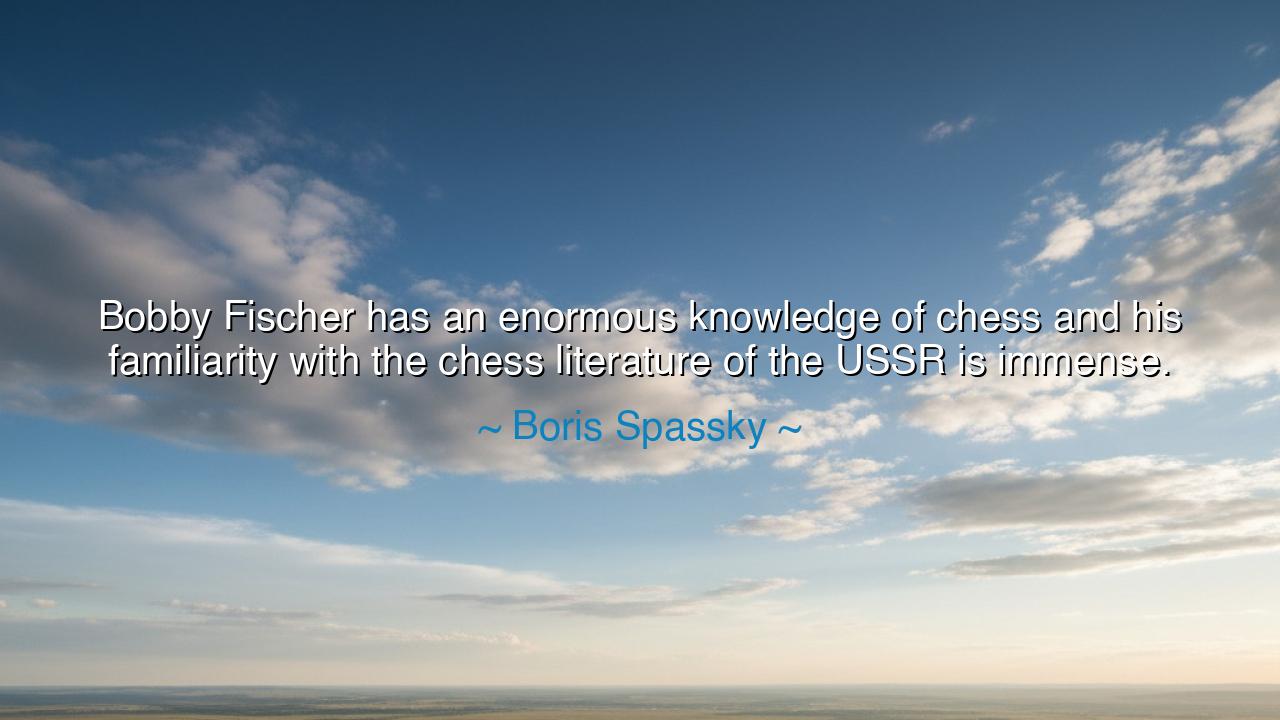
Bobby Fischer has an enormous knowledge of chess and his
Bobby Fischer has an enormous knowledge of chess and his familiarity with the chess literature of the USSR is immense.






When Boris Spassky, the reigning World Chess Champion of his era, said of his rival, “Bobby Fischer has an enormous knowledge of chess and his familiarity with the chess literature of the USSR is immense,” he was not merely praising a competitor — he was bearing witness to genius born of obsession. These words were spoken at a time when the chessboard was more than a game; it was a battlefield between nations, a cold war of intellect. And yet, Spassky’s acknowledgment transcended politics. In that moment, the Russian master bowed — not to a flag, but to excellence, to the relentless power of human curiosity that knows no borders.
In Fischer, Spassky saw something elemental, almost ancient: the archetype of the seeker. Fischer’s mastery was not a gift of nature alone but the fruit of total devotion. He devoured every book, every analysis, every game written by the Soviet grandmasters who ruled the chess world for decades. He studied their triumphs and their failures, until their wisdom became part of his bloodstream. When Spassky spoke of Fischer’s “enormous knowledge,” he was acknowledging a man who had crossed the boundaries of nations and languages to understand the very soul of the game. Knowledge, in Fischer’s hands, was not mere information — it was weapon, insight, and prophecy.
The USSR’s chess literature represented the pinnacle of human thought in the art of strategy. Soviet masters treated chess as a science — a living philosophy of logic, intuition, and endurance. To master it required both intellect and humility, for one had to sit at the feet of giants. That Fischer, an American, would drink so deeply from that well was itself a kind of poetic defiance — the student outstudying the empire of teachers. Spassky’s awe was not nationalistic; it was spiritual. He saw in Fischer what the ancients saw in the scholars of Alexandria — men who pursued truth so completely that they themselves became the embodiment of their discipline.
Their meeting in Reykjavik in 1972 — the Match of the Century — was more than a contest between two grandmasters; it was the meeting of two civilizations through two minds. The world watched as Fischer, armed with nothing but his mind and his unyielding will, broke through the fortress of Soviet dominance. But beneath the rivalry lay a bond of respect born of shared understanding. For both men, chess was not about power, but about the pursuit of perfect knowledge. Spassky’s statement immortalizes that respect — one master saluting another who had become, through sheer study and self-discipline, a mirror of the world’s finest tradition.
There is an ancient lesson in this tale. Knowledge knows no nation, no language, no ideology. It belongs to those who seek it with purity and persistence. Like a pilgrim walking across deserts to reach a sacred text, Fischer crossed intellectual borders to reach mastery. Spassky’s words remind us that greatness is not inherited — it is earned, painfully, through curiosity and sacrifice. The mind that hungers for truth, that studies deeply and widely, becomes a vessel for the wisdom of all humankind.
And yet, there is humility in Spassky’s tone — a recognition that even in rivalry, one must honor greatness where it appears. In this, his words carry a wisdom lost to many: that respect for knowledge transcends competition. The warrior of the mind does not envy his opponent’s brilliance; he venerates it, for it illuminates the same path he himself walks.
The lesson to carry forward is this: To learn is to honor those who came before, and to rise beyond them is to honor them even more. Seek mastery not through shortcuts, but through immersion. Study not to conquer others, but to conquer your own ignorance. And when you meet another who has achieved greatness, do not shrink in jealousy — bow, as Spassky bowed, in reverence. For in that reverence, you acknowledge not a rival, but the spirit of learning itself — the eternal game that outlives every player.
Thus, in the quiet dignity of Spassky’s words, we hear the echo of an ancient truth: that the pursuit of knowledge is the highest form of battle, and that victory belongs not to one man, but to the light that grows each time one mind dares to understand another.






AAdministratorAdministrator
Welcome, honored guests. Please leave a comment, we will respond soon